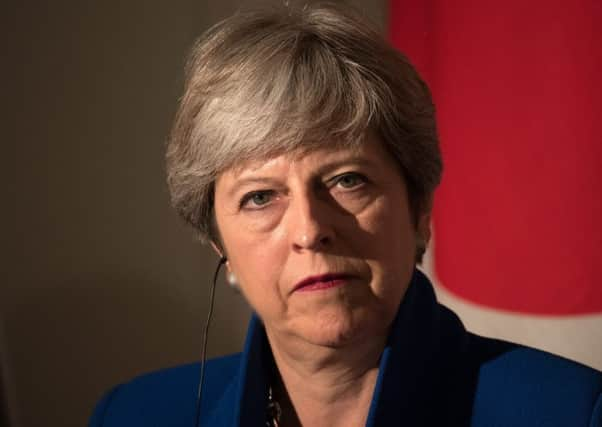Theresa May wants Britain to be EU's best friend after Brexit


The Prime Minister called for “a bold new strategic agreement” covering security and intelligence cooperation as she told EU governments that Britain would be their “strongest friend and partner” after Brexit.
She set out plans for a transition phase of “around two years” and said the UK would “honour commitments we have made during the period of our membership,” signalling that a hefty financial bill to exit the EU and maintain favourable trading access is on offer.
Advertisement
Hide AdAdvertisement
Hide AdHowever, Mrs May said she was not backing down from a threat to leave the EU without an exit deal, and offered no concessions a key Brussels demand that the European Court of Justice should have jurisdiction to protect EU nationals’ rights in the UK.
She restated her aim of reaching an “imaginative and creative” solution for the UK’s relationship with the EU, and ruled out both membership of the European Economic Area and Canada’s new trade deal with the EU as models for Brexit, saying: “We can do so much better than this.”
Mrs May’s insistence on being outside the EEA will soothe Brexiteers in her own party, and was welcomed by Foreign Secretary Boris Johnson after his week-long public spat with the Prime Minister.
Following the speech, he posted on Twitter: “PM speech was positive, optimistic & dynamic - and rightly disposes of the Norway option! Forwards!”
Mr Johnson was in the audience to hear the address, along with Chancellor Philip Hammond and Brexit Secretary David Davis, but no European leaders were present.
In a speech that contained little new detail despite being given a significant build-up, the Prime Minister instead tried to strike a more conciliatory tone in a bid to end a stalemate in negotiations.
Speaking in the Renaissance city of Florence, Mrs May acknowledged that people in the UK and across the continent were worried about the prospect of Brexit, but insisted that she was optimistic about a future in which the UK and EU live alongside one another in a deep and special partnership.
Mrs May arrived at the Santa Maria Novella church in a Maserati limousine for her speech, and spoke in front of a backdrop reading “Shared history. Shared challenges. Shared future.”
Advertisement
Hide AdAdvertisement
Hide Ad“The British people have decided to leave the EU and to be a global trading nation, able to chart our own way in the world,” said the Prime Minister.
“For many, this is an exciting time, full of promise. For others it is a worrying one. I look ahead with optimism, believing that if we use this moment to change not just our relationship with Europe but also the way we do things at home - this will be a defining moment in the history of our nation.”
Setting out her request for a two-year transition, Mrs May said it would based on “the existing structure of EU rules and regulations”. However, while EU nationals will continue to be able to come to live and work, they will have to register with UK authorities.
Clearly people, businesses and public services should only have to plan for one set of changes in the relationship between the UK and the EU,” Mrs May said.
“So during the implementation period access to one another’s markets should continue on current terms and Britain also should continue to take part in existing security measures.
“And I know businesses, in particular, would welcome the certainty this would provide.”
Mrs May said that if negotiators are unable to reach a Brexit deal, “it would be a failure in the eyes of history and a damaging blow to the future of our continent”.
But she also insisted that her previous speech on Brexit at Lancaster House in January still stood, including its threat that “no deal is better than a bad deal”.
Advertisement
Hide AdAdvertisement
Hide AdAhead of the speech, Downing Street officials indicated that the government was ready to pay £17bn over two years for access to the EU single market during a transition phase, although Mrs May did not give any figures.
Her comments suggest the final bill could be higher, once existing commitments in the current EU budget, which runs until 2020, are factored in. Brussels is understood to be demanding in excess of £60bn, a figure rejected by Downing Street.
